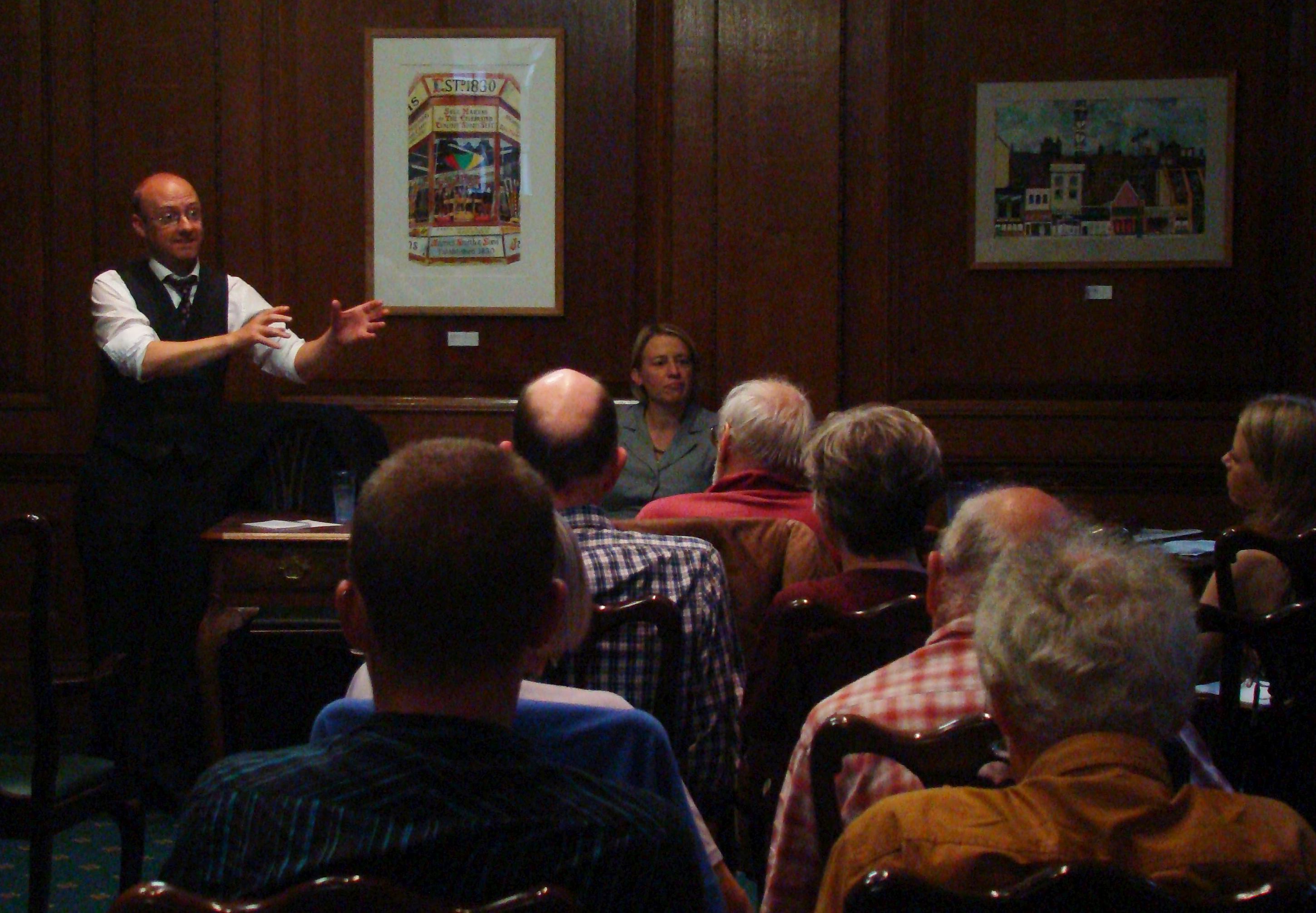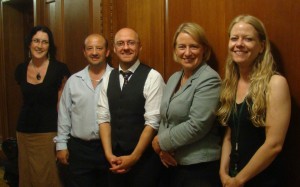Debating Scottish Independence in Camden
by Jim Jepps
On Friday night Patrick Harvie, a Green Member of the Scottish Parliament, addressed a meeting in Camden Town Hall making the case for Scottish Independence. In a lively and informative meeting Harvie tackled questions of the currency, nationalism, the EU and what those who live in England can do.
Harvie described how he wanted to put “a pro-politics message of change, not just feeding people’s resentments”.
He said that this was “a national debate, not just about who is First Minister”, that “there’s a reason to vote, there’s a reason to get involved in politics, it makes a difference and we need to provide that example – can we reconnect politics and decision making to the people [taking them away from] the political cliques that are running the show?”
As an example of this he stated that the “level of debate is way beyond the formal politics” of the Parliamentary parties, we also have “socialists of different hues, Women for Independence, involving people often for the first time, the Common Weal project, and trade unions are using the debate to set out an alternative economic strategy”, all of whom were making real contributions to the debate.
In fact, “whether [the result is] Yes or No we will end this debate with a more engaged electorate”.
Nationalism?
Addressing the question of Scottish nationalism Harvie said that “I’m not a flag waver, patriotism bores me – the referendum is not about nationalism – I can feel British and still vote Yes. I can feel Scottish and still vote No. It’s not about that.”
The question is one of democracy. “At the moment the Scottish Parliament can only firefight on inequality or poverty but we can’t tackle the causes… [we need to be able to shape a] different economic policy so we can do more than simply manage the cuts being passed down to us”.
The campaign has the potential inspiration to “change the terms of debate through out the UK”, on democracy, Trident, welfare spending and a host of other issues.
He said pollsters were finding it difficult to judge how accurate their figures are because “this debate is not like any we’ve seen in Scotland before. The feeling people will have when they have the ballot paper in their hand, their sovereignty in their hand – do we keep it or give it back?” It becomes an “emotional question – do I feel ready? Do we have confidence in ourselves?”
He hoped that “the people will wake up to the fact that politics is supposed to serve them and we have the power, if we choose to exercise it.”
There’s only been “one level of government that has refused to re-examine itself, and that is Westminster” Harvey claimed that Scottish Independence would force the question of what sort of government does this country need, rather than simply relying on a system developed in the nineteenth century.
A core moral message
Admitting that he’s not started the rather daunting tome Capital by Picketty he said it had gained popularity because it had a “core moral argument that the hoarding of wealth by the few is not sustainable in a society where everybody’s dignity matters.”
He argued that the Welfare State now specialises in two things – bullying people into low paid work, and subsidising low paid work, poverty pay. Advocating a Citizen’s Income (sometimes called a Basic Income) of £50 a week for under 16s, £100 for adults and £150 a week for pensioners we would not only guarantee that dignity but it would also provide a bottom up economic stimulus.
For this it was essential to “close the tax loop holes, we need a wealth tax… there’s no need for Scotland to pay £2 billion just be part of Nato’s nuclear club, we don’t just want to move Trident south, we want to move that money to address the things that genuinely threaten peace and security. That’s access to land, water, food, shelter, economic justice, to build a world where people can live in peace with their neighbours – we could be building hospital ships not aircraft carriers.”
It is “sickening to see the legacies of the welfare state torn to pieces, the NHS privatised, the welfare state no longer worthy of the name.” His vision of an independent Scotland is completely bound up with the power to make Scotland a fairer, better place where decisions are taken for the benefit of those who live their rather than financial institutions or the ideologues of the right.
The currency question
Asked about the currency Harvie said “my preference is for a Scottish Pound separated off at a pace that’s right for our own economy.” For too long the currency has been “shackled to ideological, right of centre austerity economics” but ultimately “how we use our wealth is more important than how we denominate it”.
Responding to a question about a united UK having more “heft” on the world stage Harvie replied that there is a “political fetish for bigness” which you can see when looking at something like “TTIP, yet another wave of the deregulated, free market model that has already failed us.”
The thing is that “Scottish interests are not identical to the UKs, and we need the ability to express those differences properly, rather than get lost in a homogeneous larger entity… regions should be able to make their own economic choices” rather than become incorporated into a larger whole that will often have a different interest or political vision.
Decision time
Harvie was asked what we should say to those not already convinced of the case for independence. He was clear that we “don’t berate people if someone’s voting no – try to understand and listen to their reasons,” and often people persuade themselves as you talk together about alternatives.
People, even on the right, are open to having the discussion as long as we take them seriously. In this country “we bail out things that are failing and privatise those things that can make a profit, even right-wing people shouldn’t be comfortable with that.
“There’s publicly owned energy infrastructute being built in Scotland – I just wish it was us that owned it, not Sweden and Norway.”
The facts are that the referendum debate, no matter which way the vote goes, has been “a chance to reshape our values – to inform our politics and economy” and while he hoped the vote would go Yes it’s just one part of fighting for more democracy, more equality and for social justice.
Red Pepper is organising a £20 train from London to Glasgow to help support the radical case for independence in the run up to the referendum vote (6th – 8th of September).




Join the discussion